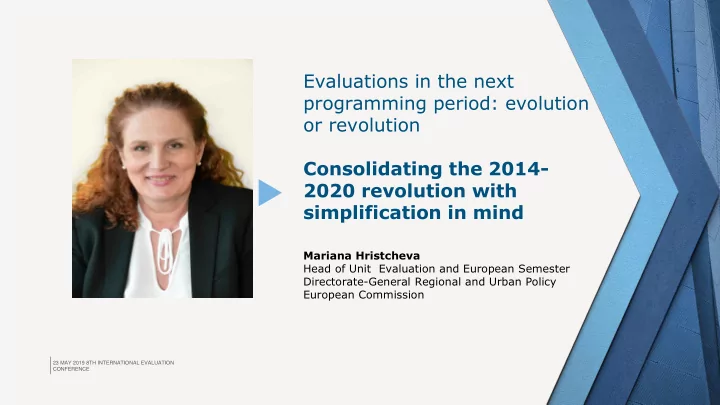

Evaluations in the next programming period: evolution or revolution Consolidating the 2014- 2020 revolution with simplification in mind Mariana Hristcheva Head of Unit Evaluation and European Semester Directorate-General Regional and Urban Policy European Commission 23 MAY 2019 8TH INTERNATIONAL EVALUATION CONFERENCE 1
Evidence-based EU policy Ex-ante: New or reviewed initiatives Ex-post: Implemented initiatives 23 MAY 2019 8TH INTERNATIONAL EVALUATION CONFERENCE 2
DG Regional and Urban Policy European Regional Development Fund, Cohesion Fund ✓ 24% of the EU Budget (€ 262 bln.) ✓ 318 programmes for 2014-2020 Focus on gathering evidence: ✓ Monitoring and Evaluation ✓ Impact Assessment and Economic Analysis 23 MAY 2019 8TH INTERNATIONAL EVALUATION CONFERENCE 3
2014-2020 revolution: strong focus on results Reinforced focus on results : • requirement for clearer programme objectives/improved intervention logic; • strengthened monitoring provisions; • stronger focus on evaluation of programme results; • introduction of a performance framework and related performance reserve. 4
The Open Data Platform of ESI Funds Data collection and dissemination ✓ Public data platform for the programming period 2014-2020 ✓ Four ESI DGs: AGRI, EMPL, MARE, and REGIO ✓ Launched in December 2015 – updated, developed and enriched regularly ✓ https://cohesiondata.ec.europa.eu/ 23 MAY 2019 8TH INTERNATIONAL EVALUATION CONFERENCE 5
The Open Data Platform of ESI Funds 23 MAY 2019 8TH INTERNATIONAL EVALUATION CONFERENCE 6
Evaluation work in DG REGIO • Design and manage evaluations providing evidence of results and outcomes of Cohesion Policy, including strategic and thematic evaluations on selected EU priorities to feed policy developments, • Impact assessments, • Ensure coherent communication on evaluation results, • Analyse evaluation results from the Member States, • Support evaluation capacity in the Member States, facilitate the exchange of good practices, • Manage the Evaluation Network, bringing together Commission and Member State evaluation expertise. 23 MAY 2019 8TH INTERNATIONAL EVALUATION CONFERENCE 7
Current evaluation activity in DG REGIO Recently finalised and on-going evaluations : • EU Solidarity Fund, • Major projects in the field of transport, • Major projects in the field of environment, • Jaspers mid-term evaluation. Upcoming evaluations : • R&D infrastructure, • Ex-post evaluation of broadband projects, • E-cohesion 23 MAY 2019 8TH INTERNATIONAL EVALUATION CONFERENCE 8
Evaluations by the Member States 2019: 229 evaluations 2015 2016 2017 2018 2019 2020 2021 2022 2023 2024 2025 23 MAY 2019 8TH INTERNATIONAL EVALUATION CONFERENCE 9
Ex-post evaluations for the 2014-2020 programming period Art. 57 CPR: • Ex-post evaluations to examine the efficiency and effectiveness of ESI Funds and their contribution to the Unions strategy for smart, sustainable and inclusive growth, • To be completed by 31/12/2024. To be finalized after a gap analysis based on MS evaluations. Details still to be decided, including how to best complement thematic and cross-cutting evaluations. 23 MAY 2019 8TH INTERNATIONAL EVALUATION CONFERENCE 10
EU Cohesion Policy - continued investment support The Cohesion Policy will continue to provide support for jobs and growth in the upcoming programming period (2021-2027): 273 bln. (~21% of the EU budget)* Accompanied by an effective monitoring and evaluation framework *In current prices, according to the EC proposal (May 2018). 23 MAY 2019 8TH INTERNATIONAL EVALUATION CONFERENCE 11
Evaluation framework in the next programming period Designed in line with the overall drive for simplification, underpinned by the work of the High-Level Group on Simplification. Fine-tuning of the current provisions, to allow for more simplification, in line with the overall approach taken by COM in the legislative proposals of May 2018. 23 MAY 2019 8TH INTERNATIONAL EVALUATION CONFERENCE 12
Post-2020 provisions – what remains unchanged Member states (art. 39) : Evaluations during the programming period, • Functional independence of evaluators, • MS to guarantee procedures necessary to produce and collect data • needed for evaluations, Evaluation plans to be submitted to MC within 1 year of programme • adoption, MCs to examine progress in evaluations, synthesis and follow-up to • findings (art. 35). Commission (art. 40) : Impact evaluation of Funds (by 2031). • 23 MAY 2019 8TH INTERNATIONAL EVALUATION CONFERENCE 13
Post-2020 provisions – what is new MS evaluations to assess programme relevance, effectiveness, • efficiency, coherence and EU added value, Programme impact evaluation by June 2029, • MS to publish all evaluations on the internet, • Commission mid-term evaluation by end 2024, • Ex-ante evaluation no longer mandatory (possibility exists, where • necessary), No more reporting on synthesis of evaluations (only MC, no AIR). • 23 MAY 2019 8TH INTERNATIONAL EVALUATION CONFERENCE 14
A coherent calendar for evaluation work – the milestones • 1 year after the OP adoption: evaluation plans by MS, • 2024: mid-term evaluation by COM, • 2025: mid-term performance review (MS and COM), • 2029: programme impact evaluations by MS, • 2031: retrospective evaluations by COM. These are the milestones; other evaluations will be carried out by COM and the MS. 23 MAY 2019 8TH INTERNATIONAL EVALUATION CONFERENCE 15
Magnitude of change The changes aim at fine-tuning and improving the current system. • The revolution took place when we moved from the 2007-2013 to the • 2014-2020 programming period: - introduction of evaluation plans, - systematic evaluations by the MS, with an emphasis on impact covering all specific objectives. 23 MAY 2019 8TH INTERNATIONAL EVALUATION CONFERENCE 16
A simplified, yet more coherent approach Regulatory Regulations (only what is necessary) + Soft measures (evaluation culture, summer schools, peer reviews, tailored methodological support). Evaluation work Increased coherence between COM and MS evaluations. 23 MAY 2019 8TH INTERNATIONAL EVALUATION CONFERENCE 17
Conclusion The evaluation framework for the post-2020 programming period aims at: Simplifying the rules to reduce the burden on MA and beneficiaries, • Maintain those aspects which have proved useful and eliminate certain • requirements (ex-ante evaluations, reporting on synthesis of evaluations), Rely more on soft measures, instead of the regulatory approach. • Simplification-driven evolution of the Cohesion Policy evaluations 23 MAY 2019 8TH INTERNATIONAL EVALUATION CONFERENCE 18
THANK YOU! 23 MAY 2019 8TH INTERNATIONAL EVALUATION 4 CONFERENCE 19
Recommend
More recommend